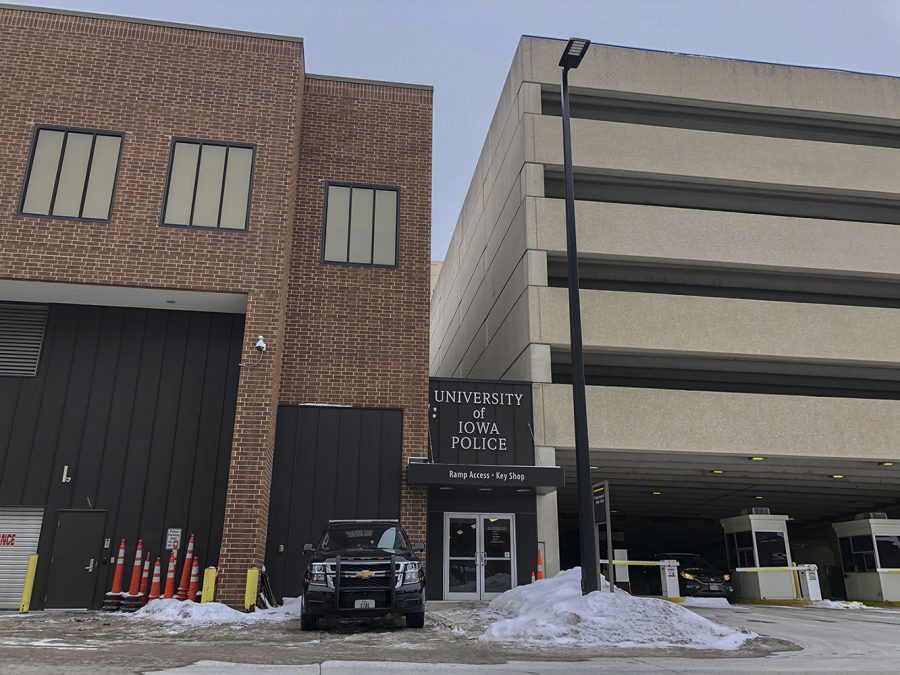Reimagining Campus Safety Committee shares findings, recommendations
The group concluded its work with five recommendations for improving support and transparency for students, adding support for mental health and basic needs.
The University of Iowa Police Station is seen on Monday, Feb. 15, 2021.
August 14, 2021
The Reimagining Campus Safety Committee has concluded its year-long effort with a report recommending more non-law enforcement response options, holistic safety services, and transparency from police at the University of Iowa.
The report highlights three main findings:
- Current campus safety measures are not effective for many students
- Additional support for mental health and basic needs is essential on campus
- The UI police department needs additional accountability and transparency.
The 40-page report outlines the initial steps to follow through on the committee’s five recommendations.
Changes implemented as a part of the committee’s work include a staff position in the Division of Student Life overseeing basic student needs, like food and clothing.
The university police department will also fund a new position in Student Care and Assistance to provide support for students who have had law enforcement contact or crisis intervention.
The university will implement a 24/7 crisis line for students in partnership with Community Crisis Services.
“We felt like outlining these initial steps that everyone could commit to and we had the resources or we’ve identified resources to support was probably the most practical,” Vice President of Student Life Sarah Hansen said. “Then the implementation team will be responsible for outlining action plans for the rest of the recommendations.”
The UI police department will also add a chief diversity officer, said Mark Bullock, interim co-director of the UI Department of Public Safety, and captain of the UI Police Department.
“That’s going to give us a better opportunity to be more in-step with the overall university DEI mission,” he said. “It’ll give us an opportunity to contribute to that as well.”
The five recommendations the group set out are to:
- Provide non-law enforcement response options for mental health and other services
- Invest in holistic safety services
- Create a Presidential Campus Safety and Accountability Board
- Collaborate with local public safety officials to align with a holistic public safety approach
- Create an implementation and assessment team tasked with carrying out the recommendations
The committee solicited public feedback at several listening sessions in the spring, and conducted focus groups with several community organizations.
The committee presented three different models for restructuring police on campus – holistic, refocusing and retraining, and police oversight and accountability.
The holistic model had the most community support, with 87 percent of survey respondents answering they had generally positive feelings about the model.
Hansen said these recommendations include elements of all three of the models the committee presented.
“One of the things that the group was really specific about is that our intention was never to adopt a model in and of itself because there are elements of all of these models showing up in our recommendations,” she said. “The models were really meant to be a digestible way for folks to understand the concepts we were coming up with.”
The committee wrote in the report that though some members of the group were interested in police abolition as a strategy, the group could not seriously consider defunding or abolishing the police due to current state Board of Regents policies that require police on campus, and state law that prohibits the Regents from reducing police funding.
“I think the group did the very best work they possibly could, given the parameters and constraints that we were working with,” Hansen said.
The Iowa Freedom Riders, one of the groups involved in the committee’s feedback process, said its feedback was not reflected in the committee’s final report.
“A focus group was done with IFR and we don’t recognize any of our feedback in the final recommendations,” the group wrote in a joint statement with Cops Off Campus to The Daily Iowan. “We were advocating for systemic changes, and these proposals are nothing but reform. Abolitionists differ from reformists in that we believe a system that is rotten at its core must be uprooted and transformed, rather than reformed or fixed.”
The Iowa Freedom Riders said there were queer students of color hoping thier feedback would be heard by the university.
“The committee decided against this because they chose instead to offer something palatable to the right-wing politicians in the president’s chair and the Board of Regents,” the group wrote.



